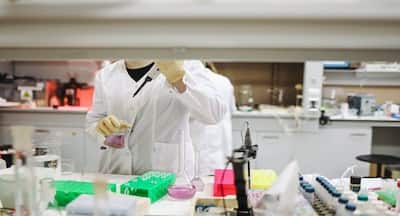Don’t Miss Out on the Latest Updates.
Subscribe to Our Newsletter Today!
Now, we have a testing platform that can detect Covid-19 antibodies within seconds

The Covid-19 testing platform can identify the presence of two Covid-19 antibodies, spike S1 protein and receptor-binding domain (RBD), from a very small drop of blood.
Researchers at the Carnegie Mellon University have developed an advanced nanomaterial-based biosensing platform that can detect antibodies specific to SARS-CoV-2, the virus responsible for the ongoing COVID-19 pandemic, within seconds. In addition to testing, the platform will help to quantify patient immunological response to the new vaccines with precision, the creators said.
A study report, published in the journal Advanced Materials, stated that the testing platform can identify the presence of two Covid-19 antibodies, spike S1 protein and receptor-binding domain (RBD), from a very small drop of blood (about 5 microliters). It can detect antibody concentrations as low as below one picomolar (0.15 nanograms per milliliter), the authors said.
The presence of the antibodies is detected through an electrochemical reaction using a handheld microfluidic device, which then sends results almost immediately to a simple interface on a smartphone.
Also Read
"We utilised the latest advances in materials and manufacturing such as nanoparticle 3D printing to create a device that rapidly detects Covid-19 antibodies," said Rahul Panat, an associate professor of mechanical engineering at Carnegie Mellon.
Because the binding reaction between the antibody and antigen used in the device is highly selective, the test has a very low error rate, claimed the researchers.
"Because our technique can quantify the immune response to vaccination, it is very relevant in the current environment," Panat added.
The authors noted also noted that the sensing platform is generic and can be used for the rapid detection of biomarkers for other infectious agents such as Ebola, HIV, and Zika. A quick and effective test could be a game-changer for controlling the spread of such diseases, they added.
Covid-19 updates from India
Meanwhile, India on Sunday reported 18,444 new cases of Covid-19, taking the toll to 10,450,284. As many as 201 people succumbed to the deadly virus in the last 24 hours. So far, 1,50,999 people have lost their lives to this condition, according to the data released by the Ministry of Health and Family Welfare.
India's fatality rate is 1.44 per cent today, said the Health Ministry, noting that the focused efforts of Centre and State/UT governments on effective clinical management of the hospitalised cases have ensured sustained decline in the mortality rate.
"With effective containment strategy, aggressive testing and standardised clinical management protocols based on holistic Standard of Care Protocol across government and private hospitals, the number of new deaths has dipped," the Health Ministry stated, as quoted by IANS.
India is getting ready to undertake the world's 'biggest vaccination drive. Two Covid-19 vaccines, Serum Institute of India's (SII's) Covishield and Bharat Biotech's 'Covaxin', have been approved for emergency use in the country. The Covid-19 vaccines are expected to be rolled out from January 16.
Prime Minister Narendra Modi will hold a virtual meeting with Chief Ministers on Monday afternoon, wherein all states will share the details of preparations made for the planned vaccination and other issues, IANS reported.
So far, three rounds of the dry run of the immunisation drive have been conducted across the country. In the first phase of the vaccination drive, the Centre plans to inoculate one crore healthcare workers and two crore frontline workers, followed by 27 crore individuals who are at a greater risk of contracting the virus.


